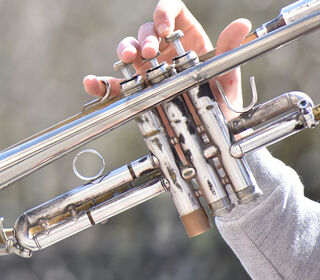
Blog Article

The One-Handed Musical Instrument (OHMI) Trust specialises in providing music-making opportunities for all through the development of specialised musical instruments. Researchers at Birmingham City University conducted a research evaluation to monitor a pilot teaching project in order to provide valuable data for future OHMI Trust projects.
Researchers
- Victoria Kinsella
- Martin Fautley
Research background
The OHMI Trust aims to remove the barriers to music-making faced by the physically disabled, through the development and production of suitable musical instruments. To support the teaching and learning of music with adapted instruments OHMI was funded to conduct a teaching and music makers project using specially adapted instruments for children aged 7-18 years. The project was evaluated by Dr Victoria Kinsella and Professor Martin Fautley from Birmingham City University.
The first teaching pilot using specially adapted instruments for children with upper limb disabilities, took place in Birmingham. They received one-to-one lessons, the opportunity to play in ensemble groups and participate in masterclasses. The teaching pilot has now progressed into Surrey/Hampshire where a further cohort of young people are taking part in OHMI activities. All the teachers involved in the projects were supported by the OHMI through a variety of activities including; initial training and continued reflective sessions.
Research aims
The project was evaluated by Dr Victoria Kinsella and Professor Martin Fautley, who, using primarily a qualitative methodology through questionnaires, observations and focus group interviews aimed to explore the teaching of the adapted instruments and pedagogical approaches. The research, explored three key elements:
Research methods
- The scale and depth of the current inequalities in music education provision faced by physically disabled people and barriers to undifferentiated musical participation.
- The teachers, the training and support required to be able to deliver effective teaching to learners with a physical disability.
- The learners where the pedagogic interaction with the teacher is the focus. Although this is well explored in literature relating to the able bodied, there is much new ground to explore in working with those with a physical disability.
Results
There have been two final research reports which set out the findings from this research and offers recommendations for both policy and practice. The key findings highlighted:
- Giving learners a goal to work towards was motivating. For some this means working from OHMI accreditation to graded examinations. It has been identified that for some young people accreditation which is aligned to the Sounds of Intent framework needs to be developed. There is further work to be done in this area.
- 30 minute lessons. Extra time is needed in order to accommodate setting up the instrument, and the physical needs of the young people where response time may be slower. If instruments can remain set up in school and at home, more time can be spent on learning in lessons.
- Positive relations with their music teacher are central for progression and motivation. This is increased further when school teaching staff and parents take an increased interest in music making and learner’s progression. This moves onto the importance of…
- Music beyond the lesson. For some of the young people ensemble playing or whole group workshop days play a significant role in their musical identity development.
- Performance. Opportunities to perform have been positive for the learner’s motivation and developing identity as a musician.
- Progress and Progression. Although for some young people progression, such as music medals or area ensembles is something that learners are still working towards, significant progress has been made by learners. They are better at playing their instrument and have a deeper understanding of what it means to be a musician. This understanding of progress needs to be made explicit to all those involved in the learners educational development.
To read the full list of recommendations, read the full report.
However, more work needs to be done:
- It was beyond the remit of this research, but further work is needed to explore the position of these young people with regards to Whole Class Ensemble Teaching (WCET, also known as ‘Wider Opportunities’).
- More teachers need to be trained to work with young people with physical disabilities.
- Accreditation needs development. The exploration of the sounds of intent framework or other forms of accreditation better suited to learners with a physical disability or SEND.
- It was beyond the scope of this evaluation but the project clearly had impact on the learner’s lifelong learning. More work needs to be done to explore the impact of the music lessons on the learners wider educational development.
Funding
Funder: The One Handed Musical Instrument Trust (OHMI)
Funding: £25,000
Publications
- Kinsella, V., Fautley, M., and Gray, S. (2018) Musical Inclusion. Birmingham, Services for Education & Birmingham City University. Available at: https://servicesforeducation. co.uk/ files/SFE_Inclusion_booklet.pdf
- Kinsella, V. and Fautley, M. (2019) Partnership work in music education for children with disabilities – an English case study. European Perspectives on Music Education. EAS publications, Heilbling, Innsbruck, Austria
- OHMI Music-makers report (2018). Dr Victoria Kinsella and Professor Martin Fautley. For OHMI Trust and Arts Council England.
- OHMI Teaching Pilot (2017). Dr Victoria Kinsella and Professor Martin Fautley. For OHMI Trust and Arts Council England.